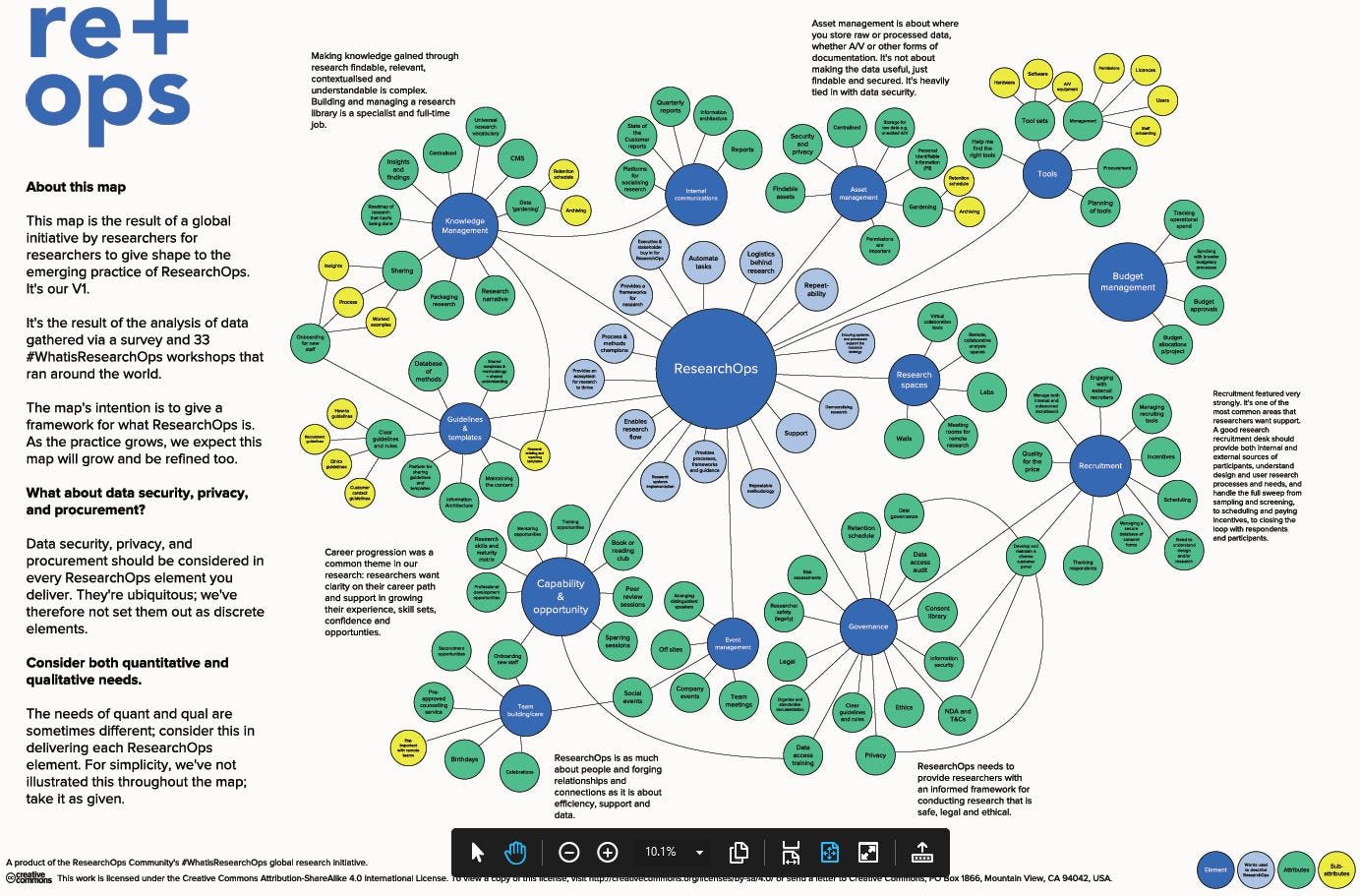Starter Guide to ResearchOps
ResearchOps is the way to conduct research optimally in the digital age, where everything moves at lightning speed. ResearchOps streamlines research work, which enables getting data faster and collecting insights from the data in order to make better decisions.
ResearchOps requires an organization to invest in knowledge management, data infrastructure, processes, people, and technology. These intentional strategies will lead to better research insights, faster decision-making, and improved customer experience.
What is ResearchOps?

ResearchOps is the process by which people, processes, tools, and strategies are optimized in order to create a repeatable system (or systems) that support research at scale. ResearchOps is based on the belief that if research’s organizational aspects are taken into account, and reproducible so that they may be scaled, it will have a greater impact.
In other words, ResearchOps is fundamentally a set of people, processes, and mechanisms that are integral to getting research moving. It helps you with all the tasks that go into this goal like team building, tool usage, etc.
Main Goals of ResearchOps
A streamlined way of working and thinking, research operations is a mindset that has been adopted by leading companies in order to make their research processes more structured and efficient.
ResearchOps is a framework to help the user research team achieve better results in their usability studies. It is also a practice that helps to integrate research more effectively into the organizations’ product development process.
ResearchOps has four main goals:
- Improve the efficiency of research by integrating it with operational processes
- Create a unified environment for conducting research and operations
- Drive impact of user research data across the organization by making data easily accessible
- Streamline interpersonal relationships within and outside the organization

Importance of Data within the ResearchOps Process
ResearchOps is born from the need for applying research insights to the product development process. It is about using data to drive decisions and actions, by putting research at the heart.
Without a ResearchOps function, the user research team members do not have the structure and processes needed to conduct research in a streamlined way.
A research operations function enables user researchers to do what they do best: research. Otherwise, researchers can spend over 50% of their time doing operational tasks that detract from their main job function.
Not having this function becomes expensive over time because user research team members and other roles have to take on these responsibilities. It’s an opportunity cost to the company.
User research benefits companies. User research practices go beyond designing a better product or service. It’s about designing a better experience for customers.
It’s clear that UX research can help us understand our customers better, but it can also help us understand our own business.
Yet, in order to make data-driven decisions, we need to be able to collect data on all aspects of our business such as marketing campaigns or customer support interactions.
There’s nothing more frustrating than spending a lot of time and money conducting a research study, but then other user insights not going beyond that one study or project team. Establishing a ResearchOps practice of knowledge management aims to centralize these customer insights so that the data lives beyond one study.
Data is power. By collecting this data for user research into one knowledge management system or research repository, UX researchers and product teams can start making sense of it and using it as a competitive advantage over our competitors. This data can come from both internal sources and external sources.
In other words, data is the fuel that drives innovation in the digital age. With all of our data at our fingertips, companies are able to make more intelligent decisions faster than ever before.

The Different Pillars of ResearchOps and How They Work to Make Data-Driven Decisions
The Eight Pillars of User Research is a guide to research practices in the digital age for user research. It is designed for people who are interested in understanding how research operations and user research, in general, can be improved and what it takes to do research as an organization.
1. Environment
In the past, research has been conducted in a closed and controlled environment. Data was collected and analyzed with the researcher being the only person who could do anything with it. But now, researchers can share their data and analyze it collaboratively.
The ResearchOps environment is a collaborative and supportive space for researchers to work together. This space provides the tools, training, and support needed for the research process. The environment is designed to be flexible so that it can change with the needs of the research team.
2. Scope
In the process of ResearchOps, the pillar of scope is a key component in determining what needs to be done. It is important for organizations to understand their requirements and limitations in order to properly research and develop new products.
The pillar of scope includes four components:
- The goal or objective for the project
- The time frame for the project
- The resources available for the project
- The constraints on the project
3. People
As mentioned above, the goal of ResearchOps is to make it easier for researchers to access data, collaborate with one another, and publish their results. For these reasons, ResearchOps is about empowering people to find the best information for their work.
The role of ResearchOps specialists within a research team can be summarized as follows:
- Aid in participant recruitment
- Enable the function of regularly sharing insights
- Support researchers in conducting research by providing tools, training, and resources.
- Manage consent forms and compliance
- Creating a community of professional practice by establishing clear career paths for individual researchers
4. Organizational Context
Organizational context establishes the return on investment of research ops. There are many different contexts that cause organizations to make the transition from traditional research practices to ResearchOps.
The organizational context of an organization can be defined as its environment, culture, and structure. The organizational context will have a significant impact on how ResearchOps are implemented in an organization and what benefits they will generate.
Organizations with a strong culture of innovation and exploration will benefit more from implementing ResearchOps than organizations with a tradition of conservatism because they have more open mindsets towards change.
The organizational context is a critical element in the ResearchOps process. This is because it provides a framework that can be used to understand the challenges and opportunities within an organization.
5. Recruitment and Admin
The participant recruiting team has a crucial role in ResearchOps, as they are responsible for sourcing, screening, interviewing, and selecting the best participants for research studies. They also need to be able to communicate with participants about what expectations of each research study.
A strong participant recruitment practice is vital in a mature UX research organization. It supports the researchers to do what they do best: user research. The participant recruitment team is responsible for ensuring that participant management efforts are carried out efficiently and effectively. This includes everything from making sure the right resources are available when needed to providing feedback on the quality of participant recruitment.
Finding research participants can be challenging. There are plenty of user research recruiting tools to find participants, however sometimes those don’t find the niche participants needed. That’s where actual recruiters help.
The recruitment team also manages the participant panel. Participant management involves ensuring that the participant panel is healthy and robust. It makes sure that the research participants are quality and available to participate. Panel management software helps with this.
6. Data Knowledge and Management
Data knowledge and management is an important aspect of ResearchOps because it ensures that the data collected is reliable, accurate, and can be analyzed in a meaningful way.
Knowledge management within ResearchOps is to collect, analyze, and synthesize data in order to make better decisions. This process can be broken down into three parts:
- Data collection includes collecting the data in a standardized way so that the user insights are discoverable
- Data analysis includes aggregating and discovering trends across different user research studies
- Data synthesis creates meaning from the data.
The first step of having a strong knowledge management practice is to build out a research repository. There are many research repository tools out there to get you started.
7. Governance
Governance in the process of ResearchOps is an important topic. With all the different regulations about data privacy and compliance, the governance team ensures that the company’s and the users best interests are at heart. This involves data consent forms and practices around protecting the participants’ personally identifiable information (PII).
It’s a huge responsibility to ensure that this is done correctly.
8. Tools and Infrastructure
ResearchOps uses tools and infrastructure to efficiently manage user research. It is a process that improves the user research process by automating it.
Examples of user research tools are:
- User testing tools
- Research repository tools
- Panel management software
- Survey tools
- Transcription software
- Incentive tracking software
Establishing an infrastructure of tools and processes enables user research teams to conduct research without having to think about all the various logistics that go into a research project.

What is a Research Operations Manager and What are They Responsible for?
A Research Operations manager can be responsible for all eight of the user research pillars we just discussed, or there might be several Research Operations managers working across these pillars.
This role can be found in various industries such as healthcare, education, and government. They are typically responsible for assisting projects that involve qualitative or quantitative data collection from internal or external sources.
This role is essential to the success of user research. They play a part in the entire research process, from start to finish. They need to be able to identify areas that may need improvement and make adjustments accordingly. They also must be able to manage resources as needed.
Important responsibilities of a research operations manager might include:
- Recruiting participants for projects
- Ensuring consent forms are signed
- Establishing a tooling infrastructure
- Monitoring budgets for projects.
- Managing project data in the research repository and ensuring compliance with regulations.
- Making sure that user research projects are on schedule.

How to Create a Successful ResearchOps Function
ResearchOps is a function that is becoming increasingly important in companies. The function aims to help the company’s user research and development teams by providing them with the right tools, data, and resources.
A research team has a lot on its hands. They need to find and collect the data, process it and analyze it, store it in a database, and finally, present their findings to management.
In order to create a successful ResearchOps function, it is important to: prioritize, scope, plan, and execute.
Trying to address all eight pillars of user research at once would be impossible. Especially because many companies hire only one research operations manager to begin with. Most ResearchOps functions are very small.
When you’re a ResearchOps team of one or a small team, you need to prioritize and scope your work. Perhaps you do user research internally by sending out a survey, going on a listening tour, conducting a workshop, or interviewing your team members individually. Find out the biggest pain points for your organization. Figure out some areas you can quickly tackle and make a positive change. Decide which are the projects that will take longer and scope your work accordingly.
By strategically approaching ResearchOps as a design challenge, you’re able to make bigger impact.

ResearchOps and its Relationship with Other Important Areas
ResearchOps is a relatively new field that has been defined as the intersection of research and operations. It’s a term that encompasses efforts aimed to support researchers in planning, conducting, and applying quality user research.
It is a cross-disciplinary field that combines elements from operations management, project management, data science, and research methods to address the needs of researchers in the industry.
The relationship between ResearchOps and other important areas is that ResearchOps can help drive a higher return on investment for user research. This will lead to better data collection, good quality data that is easier to analyze, and quicker discoveries of new insights.
ResearchOps can assist execution of user research by:
- Informing product development, marketing, and business strategy with insight collection
- Ensuring governance and ethics are upheld across research studies
- Standardizing research processes needed for researchers to apply consistent quality of research across teams
- Evaluating the impact of user research on company performance

What are the Requirements for Becoming a Research Operations Manager?
The requirements for becoming a ResearchOps manager involve being able to work fast and iterate. It helps to have a background in project management; however, user researchers with an interest in operations often become research operations managers.
There are some specialties that one should have in order to be successful in this position. These include knowledge management of the user research process, familiarity with the field of study, and strong communication skills.
In order to fulfill this role, one must first have experience in research and/or project management work. They also need to be familiar with the field of study for their current position or know how to find information about it quickly if they are not already familiar with it. Finally, they need strong communication skills so that they can work with researchers and communicate with internal stakeholders effectively.
ResearchOps managers have the responsibility of overseeing research projects that are conducted by their company or organization. Some of the top qualities that they must have are:
1. Planning: They need to plan for all research activities. They ought to know who is doing what, when, and how much it will cost.
2. Coordination: Research operations managers need to coordinate with other departments in order to ensure that the research is being done on time and within budget constraints.
3. Communication: They need to communicate with researchers, clients, vendors, and other stakeholders of the organization about the status of the project at any given time so that there are no surprises along the way.
4. Analysis: Research operations managers need to analyze data collected during a project in order to identify trends or patterns that can be used as indicators for future improvement. These managers must not only analyze data but also understand the context and meaning of the data in order to identify specific issues that need to be solved.
Benefits of a ResearchOps Practice for Your Business
1. It improves decision making
One of the key benefits of brainstorming is that it improves decision-making. Brainstorming involves generating a large number of ideas and then evaluating them to see which are best. This can help people make better decisions in a variety of contexts like at work, at home, or school.
2. It increases access to data
The internet has made the world’s data more accessible to people than ever before. It’s allowed people with no internet access to discover information and create content. The internet is also a place where people can be anonymous and share their thoughts with other like-minded individuals.
3. It lowers the cost and time of research
Research is integral to many professions and can be time-consuming and expensive. The research can be done in person or online but either way it is a lengthy process. Researching online saves time but it is not always accurate which can lead to incorrect results.
4. It reduces risk in business decisions
ResearchOps integrates the latest research with data analysis, qualitative feedback, and expert opinion in order to provide more accurate, reliable, and empirical decision-making.
The goal of ResearchOps is to reduce risk in business decisions by using data and analytics. This practice is used primarily in healthcare, finance, manufacturing, and other industries. ResearchOps takes advantage of advances in technology, such as cloud computing, mobile devices, and smartphones to collect data from many different sources and it offers more transparency for decision-making.
5. It increases collaboration between teams
ResearchOps employs a variety of methods for research and data acquisition. Teams are now able to share data, collaborate, be more transparent about their methodology, and share the credit for findings.
Summary
ResearchOps is the newest buzzword in the field of research. It’s a term that has been coined to describe the intersection of research and operations, or the practices of research and innovation. This practice bridges two worlds that often operate in isolation from one another: Research, which is typically concerned with generating new knowledge management processes and research insights, and Operations, which is focused on implementing those research insights into day-to-day workflows.





